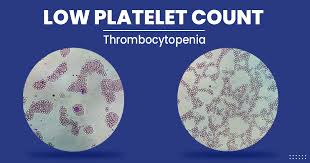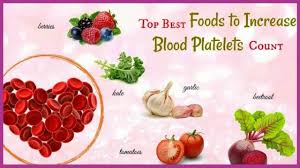
Low Platelets Count

A low platelet count is a blood disorder that has a long list of possible causes. Also known as thrombocytopenia, it is not always a serious problem. The bleeding it causes can be serious in some cases, however. The treatments for a low platelet count are aimed at whatever causes are behind the reduced platelets.
Low Platelet Count Causes (Thrombocytopenia)
Some of the most common underlying reasons for alternations in normal blood platelet counts include:
Enlarged Spleen
The spleen helps fight infections and clean the blood, so illnesses that cause an enlarged spleen can cause too many platelets to become trapped inside while the body tries to fight off bacteria or a virus. In healthy people, around one-third of the body's platelets are held in the spleen, but conditions like liver disease/cirrhosis prevent scarring, which keep platelets harbored inside.
Reactions to medications and over-the-counter drugs
Platelet production can be altered due to the use of drugs, including diuretics, NSAID anti-inflammatory drugs and antibiotics, or frequently taking common painkillers like ibuprofen and aspirin.
Reactions to medications and over-the-counter drugs
The spleen helps fight infections and clean the blood, so illnesses that cause an enlarged spleen can cause too many platelets to become trapped inside while the body tries to fight off bacteria or a virus. In healthy people, around one-third of the body's platelets are held in the spleen, but conditions like liver disease/cirrhosis prevent scarring, which keep platelets harbored inside.
Autoimmune diseases
Diseases like lupus and rheumatoid arthritis cause the immune system to mistakenly attack and destroys platelets. This is called immune thrombocytopenia or ITP.
Alchol
Alcohol slows the production of platelets and is the biggest problem when it's consumed excessively, especially if someone's diet is also low in nutrients.
Poor diet and nutrient deficiencies
Certain nutrients are needed to make enough platelets, including iron, vitamin B12 and folate. Being deficient in these nutrients can change how many are produced and able to survive for normal time periods. The Platelet Information and Blood Testing Laboratory recommends making sure you get enough of these nutrients through your diet in addition to calcium, vitamin K and vitamin D.
Infection and Viruses
Rarely, severe bacterial infections involving the blood cause a pause in platelet production. Viruses that can change how platelets are renewed include chickenpox, mumps, rubella, hepatitis, HIV/ AIDS and certain other rare viruses. Most of the time common viruses only alter blood platelets temporarily, but some serious viruses like AIDS can permanently cause damage.
Toxin exposure from the environment
Chemicals commonly found in the environment,slow the production of platelets.
Pregnancy
Sometimes pregnant women temporarily experience slowed platelet production, but this is usually mild and goes away after the baby is born. Estimates show that around 5 percent of pregnant women develop mild thrombocytopenia at some point during their pregnancies.
Genetics
Certain conditions that run in families and are inherited cause low platelet counts, including Wiskott-Aldrich and May-Hegglin syndromes.
Cancer
Leukemia or lymphoma directly damage bone marrow and destroy blood stem cells, but also most common cancer treatments (radiation and chemotherapy) destroy stem cell even more.
Aplastic anemia
When the bone marrow stops making enough new blood cells, called aplastic anemia, it causes a low platelet count.
Fever
High Fevers are also main cause of reducing platelets count.


